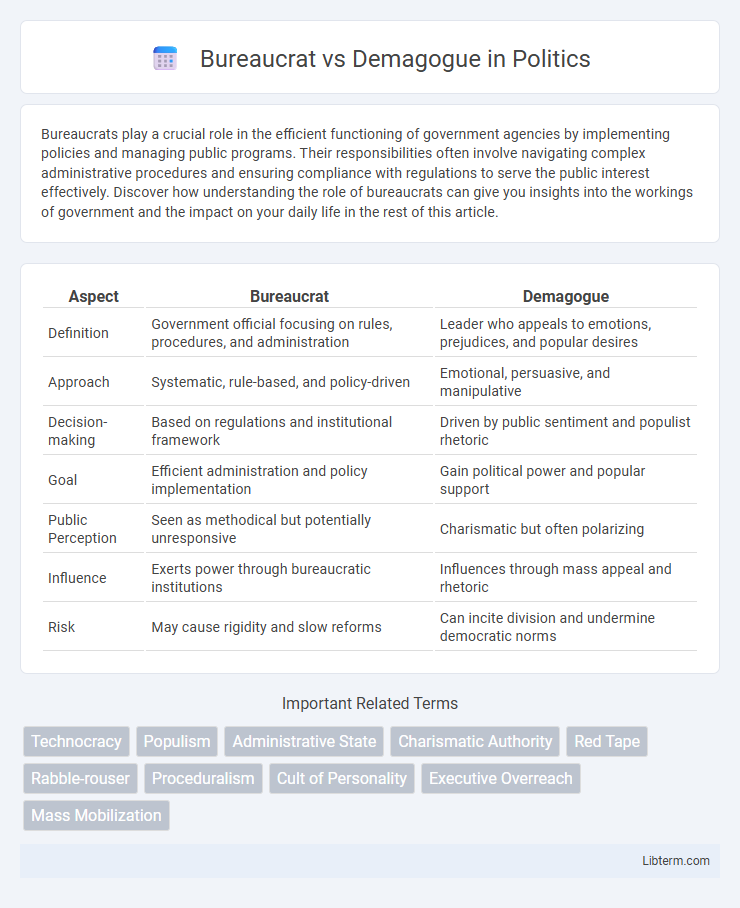Bureaucrats play a crucial role in the efficient functioning of government agencies by implementing policies and managing public programs. Their responsibilities often involve navigating complex administrative procedures and ensuring compliance with regulations to serve the public interest effectively. Discover how understanding the role of bureaucrats can give you insights into the workings of government and the impact on your daily life in the rest of this article.
Table of Comparison
| Aspect | Bureaucrat | Demagogue |
|---|---|---|
| Definition | Government official focusing on rules, procedures, and administration | Leader who appeals to emotions, prejudices, and popular desires |
| Approach | Systematic, rule-based, and policy-driven | Emotional, persuasive, and manipulative |
| Decision-making | Based on regulations and institutional framework | Driven by public sentiment and populist rhetoric |
| Goal | Efficient administration and policy implementation | Gain political power and popular support |
| Public Perception | Seen as methodical but potentially unresponsive | Charismatic but often polarizing |
| Influence | Exerts power through bureaucratic institutions | Influences through mass appeal and rhetoric |
| Risk | May cause rigidity and slow reforms | Can incite division and undermine democratic norms |
Understanding the Bureaucrat: Definition and Role
A bureaucrat is a government official responsible for implementing policies and managing public administration within a structured hierarchy, ensuring stability and adherence to established rules. Their role emphasizes procedural expertise, continuity, and impartiality to uphold effective governance and public service delivery. Bureaucrats operate within formal institutions, maintaining order and facilitating the efficient execution of laws and regulations.
Who is a Demagogue? Key Characteristics
A demagogue is a political leader who gains support by appealing to popular desires, emotions, and prejudices rather than rational arguments. Key characteristics include charismatic oratory, manipulation of public opinion, exploitation of social fears, and promotion of divisive rhetoric to consolidate power. Unlike bureaucrats, demagogues prioritize personal gain and mass mobilization over institutional rules and objective governance.
Historical Origins: Bureaucrats vs Demagogues
Bureaucrats trace their origins to ancient civilizations like Mesopotamia and Egypt, where structured administrations managed resources and governance through formal rules and hierarchical systems. Demagogues emerge prominently in classical Athens, as politicians who exploited popular desires and prejudices to gain power through emotional appeal rather than rational policies. The historical contrast highlights bureaucrats' emphasis on institutional stability versus demagogues' focus on charismatic manipulation within political contexts.
Core Motivations: Duty vs Popular Appeal
Bureaucrats are primarily motivated by a sense of duty, adhering to rules and procedures to maintain order and implement policies efficiently. Demagogues, on the other hand, seek popular appeal by exploiting emotions and public sentiments to gain support and power. This fundamental difference shapes their decision-making processes and leadership styles significantly.
Influence on Governance and Policy
Bureaucrats influence governance through structured implementation of policies, ensuring consistency, compliance, and administrative efficiency within government frameworks. Demagogues shape policy by appealing directly to popular sentiments, often using rhetoric to mobilize public opinion and pressure political institutions, sometimes bypassing established decision-making processes. The tension between bureaucratic stability and demagogic populism significantly impacts policy outcomes and the balance of power in governance systems.
Strengths and Weaknesses of Bureaucrats
Bureaucrats excel in maintaining order through adherence to rules and procedures, ensuring consistency and impartiality in governance. Their strengths include expertise, stability, and the ability to implement complex policies efficiently. However, bureaucrats often face criticism for inflexibility, resistance to change, and potential inefficiency due to rigid adherence to regulations.
The Manipulative Tactics of Demagogues
Demagogues exploit emotional appeal, fear, and misinformation to manipulate public opinion, contrasting sharply with bureaucrats who adhere to structured procedures and evidence-based decision-making. They often use rhetoric that incites division and scapegoating, bypassing rational discourse to consolidate power rapidly. This manipulative tactic destabilizes institutions by eroding trust in formal governance and promoting populist agendas.
Public Perception: Trust and Distrust
Bureaucrats are often perceived as reliable due to their adherence to rules, procedures, and institutional knowledge, fostering trust in their consistent and predictable governance. Demagogues, however, frequently evoke distrust because they tend to manipulate emotions and exploit populist rhetoric, undermining rational decision-making. Public perception hinges on the balance between stability offered by bureaucrats and the appealing, yet potentially deceptive, promises made by demagogues.
Bureaucratic Stability vs Demagogic Volatility
Bureaucratic stability is characterized by consistent policy implementation, institutional procedures, and long-term planning that ensure governance continuity and public trust. Demagogic volatility emerges from emotionally charged rhetoric, rapid shifts in political stance, and populist appeals that prioritize short-term gains over sustainable governance. The contrast highlights how bureaucrats maintain systemic resilience while demagogues often provoke unpredictable political fluctuations.
Modern Examples and Their Societal Impact
In modern politics, bureaucrats like Angela Merkel exemplify steady governance through expertise and institutional processes, fostering social stability and economic growth. In contrast, demagogues such as Donald Trump use populist rhetoric and emotional appeals to mobilize support, often exacerbating political polarization and societal divisions. The societal impact of bureaucrats centers on policy continuity and trust in institutions, whereas demagogues frequently disrupt democratic norms and provoke public unrest.
Bureaucrat Infographic

 libterm.com
libterm.com